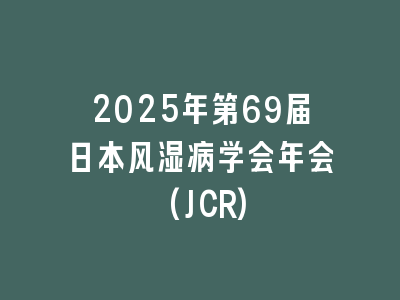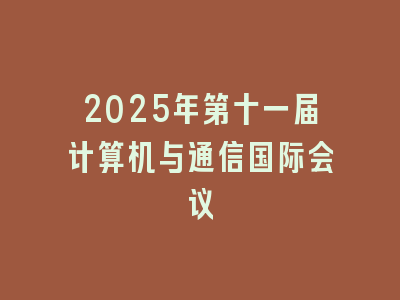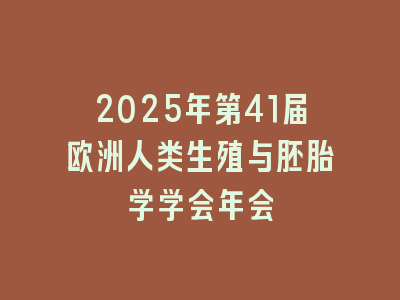
|
◆ 会议时间:2025年4月24-26日
◆ 会议简介: 2025年第69届日本风湿病学会(JCR)年会将于2025年4月24-26日在日本福冈举行,会议由日本风湿病学会(JCR)主办。 日本风湿病学会(JCR)成立于1957年,日本所有主要科学和医院机构的执业医师、研究科学家和学术学者中,有9964人是日本风湿病学会(JCR)的成员。JCR的宗旨是通过分享风湿病发病机制的知识,来减轻个人和社会对风湿病的负担,从而改善风湿病的治疗、预防和康复。JCR每年春季举办年度科学会议,为风湿病学家和其他专家宣提供一个分享风湿性疾病预防和治疗知识人平台;JCR还举办国际风湿病学研讨会,组织区域教育课程以及先进的讲座等等。未经许可禁止复制摘录转载本站任何内容-国际医学会议网(lingyuint.com)。
征文投稿: 一般演題登録期間:2024年9月12(木)~10月31日(木)正午 Submission Period: September 12(Thu.)- October 31(Thu.)2024, noon(JST)
Welcome Message The 69th Annual General Assembly and Scientific Meeting of the Japan College of Rheumatology (JCR) will be held for three days from April 24 to 26, 2025 at the Fukuoka International Congress Center, Fukuoka Sunpalace Hotel and Fukuoka Kokusai Center. It is a great honor to host this meeting, which has a long history since being inaugurated in 1957. As is well known, medical research is making significant progress and increasing emphasis is being placed on cutting-edge research for clinical applications to benefit patients, rather than falling into the trap of doing research for research’s sake. The findings being published in books and journals and announced in symposium lectures in this field are eye-opening, and the revolutionary development of biomolecule measurement technologies, such as scRNA-seq and next-generation sequencing, and the digital transformation of information technology, is clearly playing a key role in driving future medicine. The path forward seems to be the use of big data and AI for data-driven research and hypothesis-driven research, which my generation is familiar with, depending on the stage in the research process. Real-world data, such as electronic medical records and medical receipt information, obtained from doctors’ daily treatment of patients are also being integrated into big data. We tend to think that knowledge becomes outdated quickly, but what is important in both research and clinical practice is how to pose appropriate questions. Although knowledge and skills learned in training may become obsolete rapidly, the ability to think logically and ask good questions never becomes obsolete. It is society that nurtures the tree of science, and advances in medicine and clinical practice are based on the trust and consensus of society. However, the social environment surrounding medicine and clinical practice is changing greatly, with working-style reforms for doctors and the associated reallocation of tasks starting this April in Japan. The medical field is also becoming increasingly segmented and specialized. The JCR is classified into subspecialty fields of connective tissue diseases and rheumatology, which can serve as a platform for subspecialty collaboration within multiple basic fields such as internal medicine, orthopedics and pediatrics. We tend to focus only on our own specialized field. The JCR can greatly contribute to subspecialty cross-disciplinary training and networking, as well as drawing attention to junior experts, developing the next generation of leaders, and encouraging globalization. In the field of connective tissue diseases and rheumatology, the introduction of remarkable molecularly-targeted drugs has been integrated with advances in biomolecule measurement and information technologies, leading to translational and reverse translational research aiming for precision medicine. Their outcomes have been reflected in clinical practice guidelines and algorithms. Thus, significant progress in connective tissue diseases and rheumatology is being applied in clinical practice. Thanks to successes in molecularly-targeted therapies that have been enabled by remarkable advances in sophisticated molecular biology and information analysis, we are beginning to understand the origin of connective tissue and rheumatic diseases. To accurately deliver these benefits to patients, it is necessary to accelerate precision medicine research and address true unmet needs, while taking into account long-term safety and economic aspects. Together with you, I would like to consider a bright outlook for rheumatology from the present to the future at the 69th JCR meeting. Finally, with help and guidance from the JCR committees, I will do my utmost to ensure a successful meeting with you all. Thank you for your continued support to make this meeting fruitful. Professor Atsushi Kawakami, M.D., Ph.D. Professor and Chairman, Department of Immunology and Rheumatology, Division of Advanced Preventive Medical Sciences, Nagasaki University Graduate School of Biomedical Sciences, Nagasaki, Japan
注册费: Registration FeeThe 69th Annual Meeting of the Japanese College of Rheumatology and Annual Course Lectures (ACL) will be held on-site only. For JCR members(Tax exemption)
For Non-JCR members (Tax included)
*1 Medical or scientific professionals, clinicians, M.D, PhD *2 Nurses, physiotherapists, occupational therapists and other health professionals. *Registration categories should be your status as of April 24, 2025. *Allied Health Professionals (except for JCR members) and Students are required to upload their identification certificate or its equivalent formal document (PDF/JPG/PNG/GIF) when they register. *Registration is required for all participants, including graduate student.
© 版权声明 本文由分享者转载或发布,内容仅供学习和交流,版权归原文作者所有。如有侵权,请留言联系更正或删除。 相关文章 暂无评论... | |||||||||||||||||||||||||||||||||



